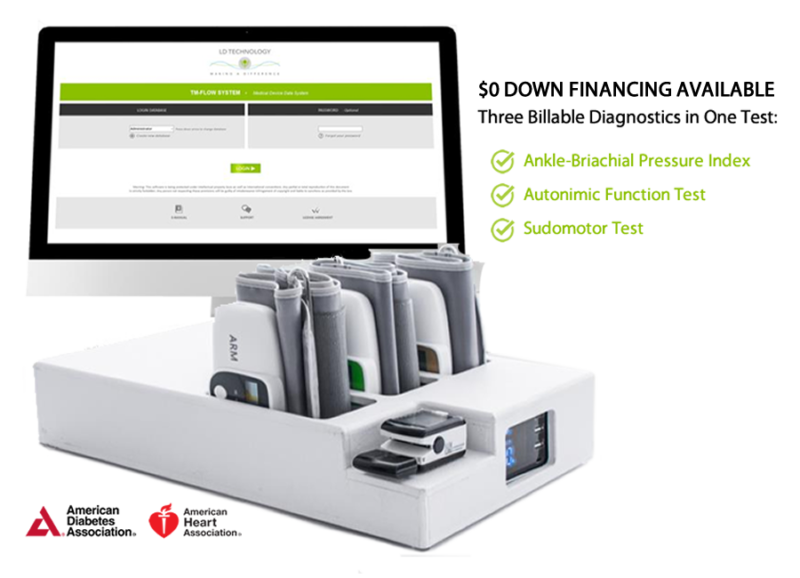Frequently Asked Questions
The TM Flow device offers numerous benefits for medical practices, including non-invasive and accurate testing, early detection of autonomic and arterial dysfunctions, and comprehensive diagnostics that reduce the overall cost of patient care. Additionally, the device’s tests are easy to bill with multi-code diagnostics, making it a valuable investment for enhancing patient care and optimizing practice efficiency. It also supports compliance with standards of care recommended by leading health organizations.
Yes, the TM Flow device is covered by Medicare and most private pay carriers. Specific CPT codes, such as 95921 for cardiovagal innervation and 93923 for ankle-brachial pressure index, ensure that the diagnostics are easy to bill. Coverage and reimbursements may vary depending on the Medicare locality, but the comprehensive diagnostics offered by the TM Flow device are widely recognized and supported by insurance providers.
Autonomic nervous system testing is crucial for diabetes and cardiovascular patients because it helps in the early detection of autonomic neuropathy, which is a common complication in these conditions. Early detection through ANS testing allows for timely intervention and management, reducing the risk of further complications. The American Diabetes Association recommends ANS testing as a standard of care for patients with Type 1 and Type 2 diabetes, highlighting its importance in effective diabetes management.
The TM Flow device is an advanced, non-invasive diagnostic tool designed to perform a series of tests that aid in the identification and early detection of autonomic nervous system (ANS) and arterial dysfunctions. It provides quantitative assessments of the ANS, helping to distinguish between early and late stages of autonomic neuropathy. The TM Flow device is particularly valuable for cardiovascular and diabetic autonomic neuropathy (DAN) testing, making it an essential tool in diabetes management and cardiovascular assessments.

TM Flow in Little Rock
There are a number of physicians in Arkansas that have patients with POTS and other autonomic disorders. Until recently, it was very difficult for them to get reimbursed for tilt table testing. Most insurance companies have come around and are now paying for it. One code that works well is CPT code 95920 (Autonomic reflex screen (eg, heart rate variability, deep breathing, Valsalva maneuver, postural hypotension). The new TM Flow instrument from Meditest has made this much easier to accomplish.
Doctors have recently discovered the value of testing for Sudomotor Dysfunction by using the TM Flow
You may have heard of Sudomotor Dysfunction, but not known what it is. Sudomotor testing is a special test that measures the response of sweat glands to stimulation. Doctors can perform this test in their office and it takes only a few minutes to complete.
Most people are familiar with an activity such as exercising or getting nervous, which causes their palms to sweat; however, some medications also cause sweating and need to be taken into consideration when conducting sudomotor testing.
But since the doctor is coding the service as a diagnostic procedure, most insurance companies cover it.
But since the doctor is coding the service as a diagnostic procedure, most insurance companies cover it.
In some cases, insurance companies may even reimburse for the TM Flow without requiring prior authorization—meaning that you don’t have to wait days or weeks for an answer from them before you can get your treatment.
Some patients don’t realize they can go out of network and still get reimbursed by their insurance company. The bottom line: if your physician doesn’t know what he or she is doing (and doesn’t have time to learn), then don’t come here!
Doctors are discovering the value of Sudomotor Testing with TM Flow
Tilt table testing is a relatively new procedure, but it’s gaining popularity in the medical community. This process allows doctors to evaluate how well your body responds to changes in gravity. Some people experience difficulty with this test because they have issues with their autonomic nervous system.
Doctors are discovering that TM Flow can be used as an alternative or complement to tilt table testing. The TM Flow provides data about your autonomic nervous system, which can help them determine if you’re at risk for heart attack and stroke by measuring your basic heart rate variability (HRV).
There are a number of physicians in Arkansas that have patients with POTS and other autonomic disorders. Until recently, it was very difficult for them to get reimbursed for tilt table testing. Most insurance companies have come around and are now paying for it. One code that works well is CPT code 95920 (Autonomic reflex screen (eg, heart rate variability, deep breathing, Valsalva maneuver, postural hypotension). The new TM Flow instrument from Meditest has made this much easier to accomplish.
Oops! Click Regenerate Content below to try generating this section again.
Tilt table testing is reported with CPT code 95921 (Tilt table evaluation).
Tilt table testing is a simple and effective way to measure the activity of your autonomic nervous system. In this test, you are placed on a table and left to rest for approximately 30 minutes. The table is then tilted from 0 degrees to 60 degrees in increments of 5 degrees every 3-5 minutes until you reach maximum angle. While on the tilt table, your doctor will monitor for signs of orthostatic hypotension (low blood pressure), postural tachycardia syndrome (excessive increase in heart rate from head up position), changes in skin color and temperature, sweating or other symptoms caused by abnormal sympathetic tone.
Reimbursement usually pays about $100-130 on average for cardiac autonomic reflex tests and $200-250 on average for tilt table testing. Obviously, this will vary depend on many factors such as the patient’s demographics and their insurance benefits. However, these numbers do tend to be fairly consistent across different geographic locations in general.
Oops! Click Regenerate Content below to try generating this section again.
Conclusion
Physicians are discovering the value of sudomotor testing with TM Flow. The new instrument from Meditest has made this much easier to accomplish. When I was a medical student, I was taught that autonomic dysfunction was rare. But since the doctor is coding the service as a diagnostic procedure, most insurance companies cover it. There are many physicians in Arkansas who have patients with POTS and other autonomic disorders
RSS FEED
- The TM Flow is a highly reimbursable diagnostic in Portland, OR
- Pain Clinics in Albuquerque, NM Adopt the TM Flow as Gold Standard
- Neuropathy in Philadelphia, PA can be detected with the TM Flow device
- Pain Management Clinics in Dallas, TX are Using the TM Flow to Diagnose Symptoms
- Unlocking the Potential of ANS Testing: Insights for Healthcare Providers
- Neuropathy clinics in Savanah, GA use the TM Flow
- Come to Charleston, WV to Get a TM Flow
- How the TM Flow will maximize your physician practice in Boise Idaho
- Doctors in Pittsburg, PA are using the TM Flow for the treatment of neuropathy
- Which Patients Require ANS Testing?
